Step into the captivating world of cockatoos, those intelligent and affectionate birds that have won the hearts of pet owners worldwide. Known for their striking crests, playful antics, and remarkable intelligence, cockatoos require a meticulously balanced cockatoo diet to thrive. In this comprehensive guide, we’ll debunk common myths, explore their natural eating habits, and provide expert tips on crafting the ideal nutrition plan for your feathered friend. Whether you’re a new owner of an Umbrella, Goffin, or Moluccan cockatoo, mastering the cockatoo diet is key to ensuring a long, vibrant life full of energy and joy.
Understanding the nuances of a proper cockatoo diet goes beyond filling a bowl with seeds—it’s about mimicking nature while addressing modern pet needs. With proper nutrition, your cockatoo can avoid common health pitfalls and flourish. For premium pellet options like nutri bird a 21, which support optimal avian health, consider integrating them as a staple.
What Makes Cockatoos Unique?
Cockatoos, from the elegant Umbrella Cockatoo to the spirited Goffin and bold Moluccan varieties, stand out in the parrot family for their social flair and dietary demands. These birds aren’t just pets; they’re flock-oriented companions that crave interaction and a nutrient-rich cockatoo diet.
Their sociability shines in the wild, where they forage in flocks, chattering and playing while sharing meals. This pack mentality means pet cockatoos need mental stimulation alongside physical nutrition. As discerning foragers, they naturally seek seeds, fruits, berries, greens, nuts, and even insects seasonally—highlighting the need for dietary variety in captivity.
Lifespan is another factor: with a balanced cockatoo diet and care akin to that for African Greys, they can live 40-70 years. Neglecting this leads to issues like obesity or deficiencies. Avian experts emphasize tailoring diets to species traits, drawing from observations at sanctuaries like Chloe’s, where improper feeding caused feather plucking.
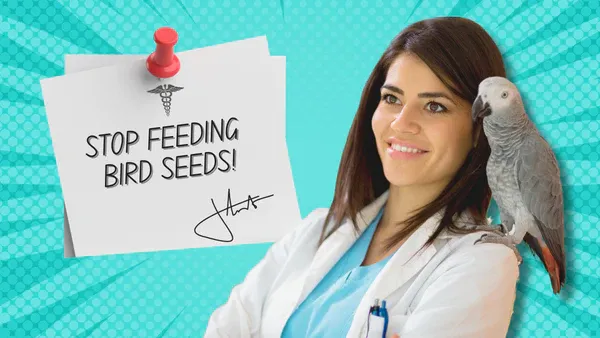 Cockatoo parrot diet
Cockatoo parrot diet
Busting Myths About the Cockatoo Diet
Misinformation abounds online about cockatoo nutrition. Let’s clarify the facts to build a solid foundation for your bird’s cockatoo diet.
Myth 1: Seeds Alone Suffice for Cockatoos
Reality: Wild cockatoos enjoy a rotating menu of fruits, nuts, seeds, flowers, and greens. An all-seed approach starves them of vitamins, leading to malnutrition. Veterinary studies, including those from the Association of Avian Veterinarians (AAV), confirm seeds should be minimal—high-fat and nutrient-poor.
Myth 2: Vitamin-Coated Seed Mixes Are Complete
Reality: Birds discard hulls, wasting coatings. Commercial mixes often prioritize taste over balance, per Dr. Scott Echols’ research on avian diets. True health comes from pellets, veggies, and fruits mimicking wild intake.
Myth 3: Cockatoos Are Naturally Picky
Reality: They’re cautious of novel foods for survival reasons, with few taste buds. Parents in the wild model safe eating; we must do the same. Transitioning via modeling—eating veggies yourself—builds trust.
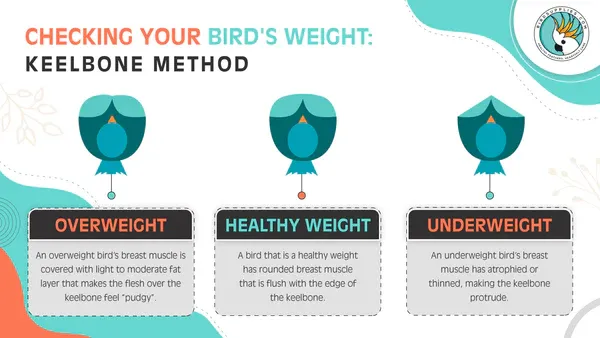 How can you tell the weight of a bird?
How can you tell the weight of a bird?
Diane Burroughs, ©2020
Wild Cockatoo Eating Habits: Lessons for Pet Owners
In nature, cockatoos forage in flocks, signaling discoveries with calls. Parents teach fledglings to select ripe fruits, nuts, and safe greens while avoiding toxins—a critical survival skill.
Chicks learn diversity early, unlike some breeders weaning on seeds for convenience. Pet owners become “parronts,” introducing pellets and produce patiently. Parrots’ neophobia (fear of new) fades with consistency, as noted in Journal of Avian Medicine and Surgery studies.
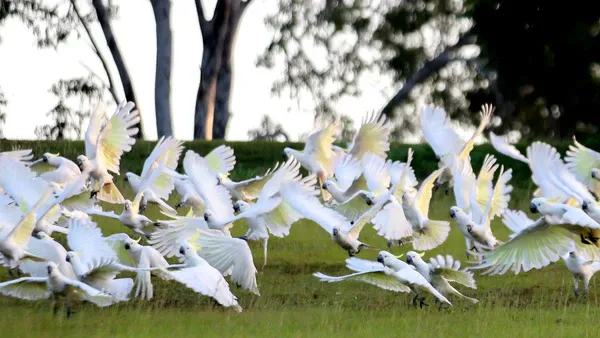 cockatoo food
cockatoo food
Risks of a Seed-Only Cockatoo Diet
An exclusive seed cockatoo diet invites disaster:
- Feather Issues: Lacking proteins and vitamins, birds pluck feathers or self-mutilate, per Chloe Sanctuary reports.
- Obesity and Fatty Liver: High-fat seeds overload the liver, causing lethargy, heart strain, and joint pain.
- Organ Deficiencies: Impacts kidneys, heart—shortening life from decades to years.
- Behavioral Decline: Anxiety and neurosis emerge without balanced nutrition.
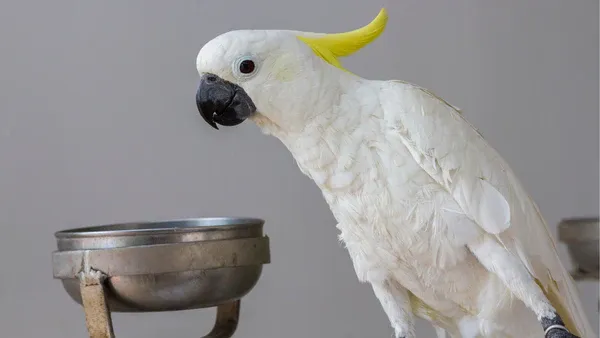 cockatoo diet
cockatoo diet
Diversify promptly: pellets (50-70%), veggies (20-30%), fruits/sprouts (10%).
Building the Best Cockatoo Diet Pyramid
A stellar cockatoo diet mirrors the wild: varied, fresh, pellet-based.
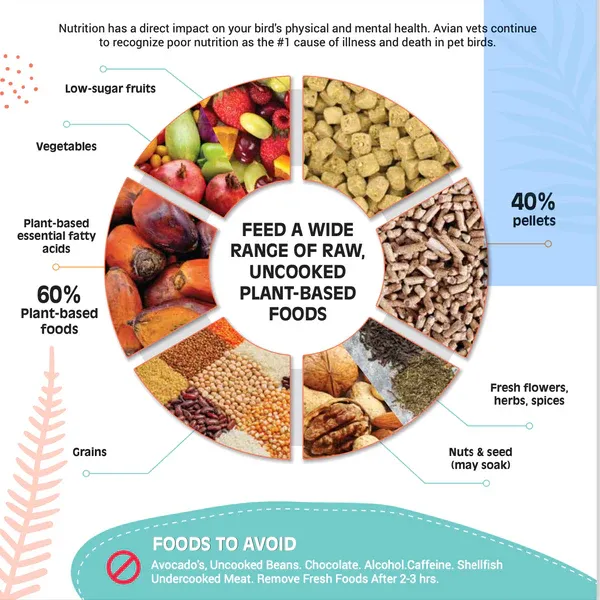 bird diet
bird diet
© Diane Burroughs
Pellet Foundation (50-70%): Roudybush, Harrison’s, Zupreem, or Nutri-Bird provide complete nutrition.
Vegetables (20-30%): Kale, spinach, broccoli, moringa—rainbow colors for full vitamins. Organic blends enhance wild-like foraging.
Fruits (5-10%): Apples, berries, melons in moderation to avoid sugar spikes.
Herbs & Flowers: Parsley, basil, dandelions (pesticide-free) add flavor and antioxidants.
Grains: Quinoa, oats for sustained energy.
Sprouts & Nuts: Soaked millet, lentils sparingly for fats.
Oils: Red palm or coconut oil boosts immunity—vet-dosed.
Protein Boost: Occasional legumes or insects like mealworms mimic wild opportunism.
Consult avian vets for personalization, per Stahl & Kronfeldt’s psittacine nutrition seminars.
Transitioning to a Healthy Cockatoo Diet: Slow and Steady Method
Abrupt changes risk starvation—vet check first, weigh daily, monitor droppings.
Dr. Scott Echols’ protocol (90% success in 90 parrots):
- Remove old food evening prior.
- Morning: Pellets only 4 hours.
- Afternoon: Small old food if needed.
- Evening: Pellets overnight.
- Refresh daily; model eating.
Ideal for foot-feeders or shy birds.
Cockatoo Treats and Training Rewards
Training: Tiny nuts, seeds, dried fruits—distinct from staples.
Nutritious: Carrot sticks, peppers, papaya slices.
Do Cockatoos Need Meat?
Primarily herbivorous, but wild ones eat insects for protein. Offer crickets sparingly.
Final Thoughts on Your Cockatoo Diet
A thoughtful cockatoo diet fosters longevity, prevents disease, and enriches life. Prioritize pellets, variety, and transitions patiently. Your avian vet is invaluable—regular checkups ensure success. Share your cockatoo stories and explore more pet bird care tips today!
References
- AAV.org: Transitioning Pet Parrots from Seed Diets. https://cdn.ymaws.com/www.aav.org/resource/collection/AE20E93E-0F61-4C20-AB88-E237BD795B43/AAV_Transitioning_Diet_final.pdf
- Chloe Sanctuary: Cockatoo Diet Insights.
- https://cockatoo-info.com/food/
- Bingham, B.: Healthy Avian Diets by Dr. Scott Echols. https://www.harmonyanimalbehavior.com/healthy-avian-diets-by-dr-scott-echols
- Cummings et al. (2022). Journal of Avian Medicine and Surgery. https://doi.org/10.1647/21-00025
- Ford, S.: Managing Your Parrot’s Lifestyle. https://northcentralanimalhospital.com/uploads/SiteAssets/762/files/forms/managing-your-parrots-lifestyle.pdf
